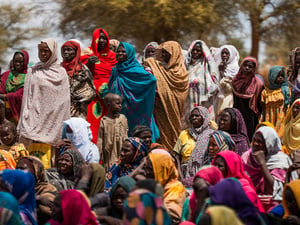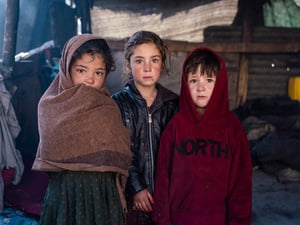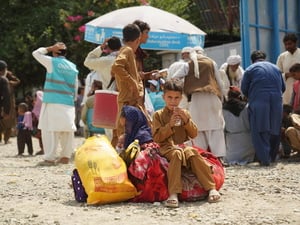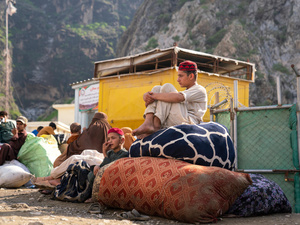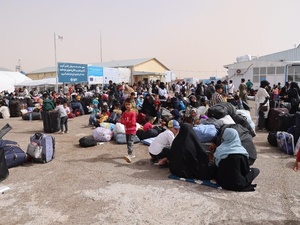UNHCR gears up for 2003 Afghan repatriation
UNHCR gears up for 2003 Afghan repatriation

Two UNHCR trainees interviewing an Afghan woman about her intention to return to Afghanistan.
PESHAWAR, Pakistan, Feb 24 (UNHCR) - Staff from the UN refugee agency's repatriation teams have been trying out their full repertoire of means to ensure that travel assistance will go only to refugees genuinely intending to return to Afghanistan for good.
Family photographs are examined, baggage opened and refugees interviewed. The iris recognition machine, which instantly detects anyone who has already been checked, is the final step in the verification.
But these "returning" refugees are actually Afghan families hired for the day and burqa-shrouded UNHCR staff playing the part of would-be returnees to test the skills of some 300 workers currently undergoing training before the pace of repatriation picks up when winter ends in March.
"The main purpose of the training is for the staff, when they go out to verify, to know how to work with refugees," says Nawal Atme, a member of the Swedish Refugee Board seconded to UNHCR. "That is why we first explain the UNHCR mandate and make sure they understand to treat refugees with respect."
Atme is supervising much of the training during the four-week-long courses. Behind her, the staff being hired for the repatriation programme are gathered around four vehicles carrying typical "returnees" who are seeking assistance to voluntarily go back across the nearby border into Afghanistan. The new staff must test the skills learnt in three days of classroom preparation, gaining practical training at Takhtabaig on the edge of Peshawar before passing a formal test on the final day.
"We have fake families and all kinds of cases - complicated cases that repatriation staff always encounter," says Atme. "It's more than detecting those not entitled to assistance - they must understand that not all refugees are cheaters and recyclers," she added, referring to people seeking assistance more than once.
While the new staff must ensure that UNHCR's limited resources go to those deserving the travel assistance, they must also not forget their duty to protect refugees. It requires decisions under often-difficult conditions - will a widow be at risk if she returns without family? Should a family leave for Afghanistan with a sick child?
These skills will be put into practice when assisted returns resume in earnest in March. While this is a continuation of the repatriation begun in 2002, the programme this year is expected to be much different from the flood of more than 1.5 million Afghans who were helped to return from Pakistan between March and December last year.
UN High Commissioner for Refugees Ruud Lubbers plans to arrive in Pakistan on March 2 to witness the start of the 2003 repatriation season and meet with government ministers and diplomats. UNHCR is seeking $195 million for its programmes in Afghanistan and its relief operations targeting Afghan refugees in the surrounding countries, but the organisation has so far received only $22 million.
The refugee agency has a planning number of only 600,000 returns from Pakistan this year, but even that could exceed the total who will go home. A survey of refugee intentions shows that many are awaiting proof that conditions in Afghanistan - such as availability of shelter, better physical security, more jobs - have improved before committing themselves to return.
Last year's repatriation focused on refugees who had moved into Pakistan's cities, while this year the plan is centred on the over 200 camps where Afghans have lived for up to 23 years. With more than half the Afghan population under the age of 15, many refugees have known no other home than Pakistan.
While most of those returning in 2002 came to Voluntary Repatriation Centres to register their intentions, families wishing to repatriate this year will tell the refugee leaders in their camps, who will inform UNHCR field staff or the Refugee Village Administrators, staff of the Pakistani government who work with the UN refugee agency.
A UNHCR mobile team will then go to the camp to interview the families and visit their homes to ensure that the return is genuine and voluntary. After verification, forms are filled out setting a departure date. On the appointed day, UNHCR teams inspect the luggage refugees are taking - another technique to determine genuine returnees that is used only in conjunction with other tests - and send them to an iris-testing centre for a final check before leaving Pakistan.
After a successful trial last October at Takhtabaig, UNHCR will operate four iris-testing facilities this year. In addition to Takhtabaig, the iris machines - never previously used in such demanding conditions - will be installed at the border town of Chaman in Baluchistan and at the village of Alizai in the remote tribal areas along the central part of the Pakistan-Afghan border. The fourth iris centre is being installed in the Afghan city of Khost as a test to see if the Pakistani centres can be transferred to Afghanistan in future.
The machine takes only a few seconds to determine if the iris being examined has been seen before. Anyone who is detected as a previous recipient of assistance is disqualified from the travel grant. But for the majority who are returning legitimately, the iris check is the last stop before receiving the UNHCR forms that will entitle them to assistance at the agency's encashment centres established inside Afghanistan.
The iris test has been welcomed by UNHCR staff as a non-subjective check for refugees receiving travel assistance to repatriate. But it must still be supplemented by the judgement of the staff undergoing training this month, both to detect potential abuse, such as repeated returns by children under 12 who cannot be iris tested, and to ensure protection of vulnerable refugees.
In the surge of last year, when initial predictions of 400,000 returns from Pakistan proved to be only a quarter of the final total, UNHCR resources were stretched and repatriation training frequently had to be rushed. The fear that mistakes were made, especially that legitimate refugees were wrongly refused assistance, troubled repatriation staff. This year there should be smaller numbers and the staff are better prepared.
"Last year we tried our best. But sometimes we were too busy and some staff did not get enough training," says Atme as the new staff tried out their interview skills on the Afghan refugees. "This year we will have no excuse."
By Jack Redden
UNHCR Pakistan

